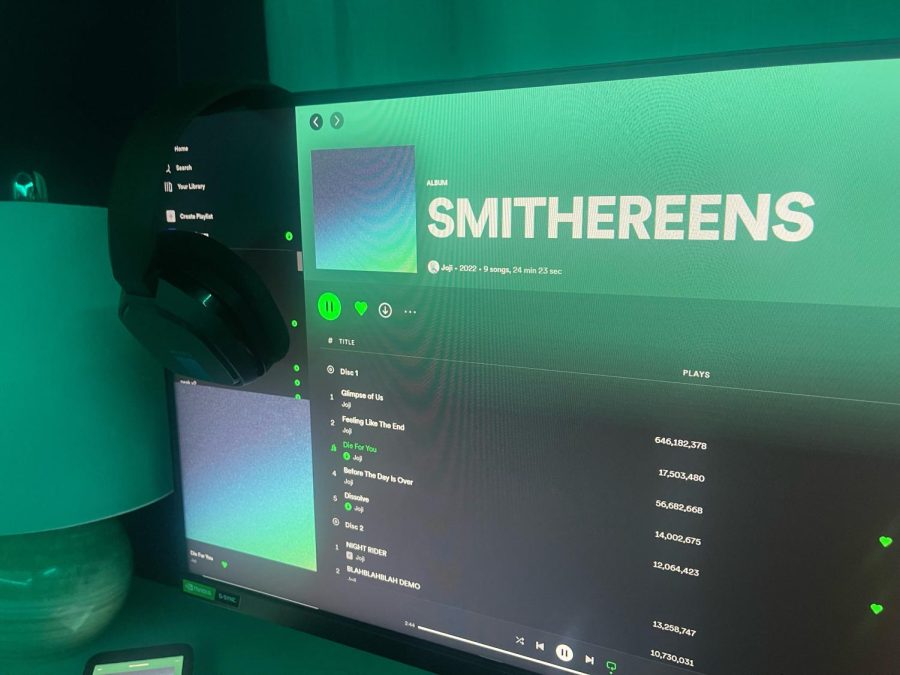Joji leaves a lot to be desired with ‘SMITHEREENS’
“SMITHEREENS” by Joji falls short in terms of songwriting, cohesiveness and consistency.
Joji released his third studio album, “SMITHEREENS,” on Nov. 4, 2022 – a mixed bag of an album that feels underdeveloped, rushed and messy, but still manages to encapsulate the sound that brought upon his stardom.
The album begins with “Glimpse of Us,” one of the biggest singles of the year and for good reason. The track really is beautiful with Joji’s impressive vocal performance alongside the accompanying soft, somber piano.
“Glimpse of Us” portrays someone in a healthy relationship who cannot help but yearn for a past lover. Joji sings, “‘Cause sometimes I look in her eyes, and that’s where I find a glimpse of us / And I try to fall for her touch, but I’m thinking of the way it was.” The mournful lyrics along with the gut-wrenching delivery provide a phenomenal ballad that leaves the listener downcast.
This track is gorgeous as a standalone single, but it feels out of place as the album’s introductory song. This is the first of many flaws with the cohesiveness of the album. The track listing can feel a bit all over the place.
The next track, “Feeling Like The End,” holds a similar tone to the first song, as it showcases Joji struggling to come to terms with a failing relationship; however, the execution here is a lot less impactful. This song feels generic, if it had to be described in one word. The instrumental feels as though it was thrown together in 15 minutes and the song’s runtime is only one minute and 42 seconds.
“Die For You” is the third track and is easily one of the best songs on the entire project. Another song about a failed relationship, Joji explains that he still wishes the best for his ex-lover.
The writing on this track is way more unique and reflective as it describes the aftermath of a breakup through the lines, “Burning photos / Had to learn to let go.” Joji elaborates that he would still do anything for this person, as he tells them, “You know I’d still die for you.”
With lush production, more thoughtful songwriting and even a longer runtime, “Die For You” is a highlight.
The following song, “Before The Day Is Over,” falls victim to more inconsistencies and flaws. While having a decent chorus, the verses are boring as they repeat ideas discussed in the previous songs. The songwriting feels stale and passionless as Joji sings, “You’ve been closing up, I expected this / But I was hoping that you’d stay open this time.”
Another highlight on “SMITHEREENS” is track five, “Dissolve.” This track remains on a depressing path, but takes a more internalized approach to the heartbreak. Joji elaborates on the personalized struggle he feels in the relationship, either by overthinking or by putting too much pressure on his partner’s shoulders.
The song is easy on the ears, yet heavy on the heart. It features a nice sounding guitar loop, an adequate vocal performance and interesting lyrics.
“NIGHT RIDER” is an interesting idea, but poor in execution. The track has generic flows and bland production, but the chorus is intriguing. Joji repeatedly sings, “I’m too precious,” with a thick layer of autotune coating his vocals– a compelling attempt at uniqueness that comes off a little bit obnoxious.
“BLAHBLAHBLAH DEMO,” as the title would suggest, sounds like a demo: unfinished and sloppy. It has a folk-sounding guitar loop that gets old about 30 seconds into the song, and when the track finally does diversify its sound, all it does is slow down the guitar loop – an unnecessary change. This track feels out of place auditorily, contributes nothing lyrically and is definitely one of the more forgettable songs.
Track eight, “YUKON (INTERLUDE),” is just decent. The production is infectious with its calming piano and mellow drums, the vocals feel a bit lazy, although the adlibs feels necessary to the production and the lyrics present captivating ideas.
These ideas fail to be fully explored; however, as the song is only two minutes and 21 seconds long. The lyrics, “Empty choir, operated from above / My voice will be their voice until I’m free / My hands will be their hands until I’m free,” are some of the most impressive examples of songwriting on the entire project, yet do not get fully fleshed out as the song ends immediately after.
The final song, “1AM FREESTYLE,” is another highlight, as it features more gripping production, intensely layered vocals and distressingly sad lyrics. The song begins with a soft piano that leads into a heavy beat drop about 30 seconds in. This track contains one of the best produced beats on the album, using the priorly noted drop to obtain momentum that continues to carry the emotional impact of the song.
The lyrics, and of course Joji’s delivery of them, also add to the closing track’s effect. Joji sings, “You know you can make it / But you can’t make it alone,” then going on to add, “And I’m tired of this madness / Tired of being stranded / I don’t wanna be alone.” With that last line being the final line of the entire project, it accomplishes the album’s goal of leaving the listener contemplative and glum.
Although “SMITHEREENS” still has that signature, melancholic sound that launched Joji into his fame, it is a consistently inconsistent body of work. With a total runtime of 24 minutes and 23 seconds, this album feels more like an EP.
There is a lack of cohesion from track to track, an overuse of certain ideas that add an unwanted tediousness to the record, some surface level songwriting and a mountain of unpolished ideas that tarnish this album.
While Joji’s talent is undeniable and even gets showcased very strongly through a few of the songs on this project, “SMITHEREENS” feels rushed. It can only be hoped that Joji will continue to improve his consistency and songwriting with any future releases.


